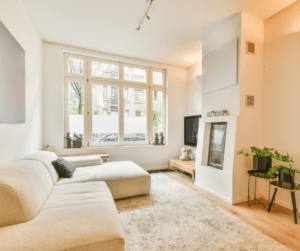Simplifying Home Layouts for Seniors with Alzheimer’s

Reducing Cognitive Overload
Alzheimer’s disease impairs memory, judgment, and problem-solving abilities, making even familiar settings difficult to manage. A cluttered or overly complex home might overwhelm seniors with excessive visual or spatial clues. Some steps to take include the following:
- Regularly Declutter: Remove excess objects from worktops, tables, and floors to make the environment more clean and orderly.
- Clear Pathways: Keep walking paths unobstructed to avoid confusion and improve mobility.
- Limit Decor: Avoid using excessive patterns or bright colors, as these can confuse seniors with Alzheimer’s.
Enhancing Safety
Seniors with Alzheimer’s are most concerned about their safety. Simplifying the home arrangement reduces the likelihood of falls, roaming, and accidents caused by disorientation. Practical steps to take include:
- Remove Tripping Hazards: Remove loose carpets, electrical cords, and crowded furniture layouts.
- Install Handrails: Place grab bars and handrails in hallways, bathrooms, and stairs.
- Create a Safe Kitchen: Sharp objects and hazardous materials should be stored in a secure location or removed completely.
Promoting Independence
Any Alzheimer’s care plan should promote independence. Simplified layouts allow seniors to navigate their surroundings more easily, preserving their sense of autonomy. These layouts also decrease dependency on caretakers for routine activities. Some of the strategies to incorporate could include the following:
- Label Important Areas: Use large-print labels or visual signs to identify rooms, drawers, and cabinets.
- Organize Essentials: Keep regularly used goods, such as glasses, medications, and phones, in convenient and consistent areas.
- Adapt Furniture Placement: Arrange furniture to facilitate movement, such as placing seats near windows or tables for relaxation.
Supporting Emotional Well-being
Seniors with Alzheimer’s often find comfort in a simplified, familiar household. By eliminating environmental stresses, the home becomes a haven of tranquility rather than confusion or irritation. Loved ones can support seniors’ well-being by taking the following steps:
- Maintain Familiarity: Avoid making dramatic changes to the home layout unless absolutely essential, as familiarity provides a sense of safety.
- Use Personalized Decor: Incorporate significant artifacts, such as family photos or treasured treasures, in a balanced and ordered arrangement.
- Create a Calm Environment: To create a calming ambiance, use soft lighting and neutral hues.
Implementing Technology
Incorporating technology into a simplified home arrangement can improve Alzheimer’s home care. Devices such as motion-sensor lighting, smart locks, and GPS trackers can improve safety while reducing caregiver stress. When caring for a loved one with Alzheimer’s, the following ideas can be incorporated:
- Install Smart Lighting: Automatic lighting lowers the risk of falling during nighttime wandering.
- Use Monitoring Tools: Devices that notify caretakers of movement or emergencies provide an additional layer of security.
- Adopt Voice-Activated Assistants: These devices can remind seniors about medications or appointments while providing hands-free operation.
Simplifying the home’s layout is more than just a matter of appearance or convenience; it is an essential strategy for Alzheimer’s home care. These deliberate changes can significantly improve a senior’s physical safety, mental stability, and general quality of life. Family members can utilize these practical strategies to create a loving atmosphere that respects their loved one’s dignity and freedom while addressing the special problems of Alzheimer’s disease.
If you or an aging loved one are considering Alzheimer’s Home Care in China Grove, NC, contact the caring professionals at TenderHearted Home Care today. Call us at (704) 612-4132
- Seniors and Unreported Falls - May 22, 2025
- Six Areas Your Loved One May Need Help With During the Early Stages of Alzheimer’s Disease - May 8, 2025
- What Harms Senior Mental Health? - April 23, 2025

